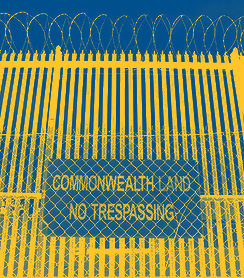High Court to hear new anti-offshore case
 Over 150 asylum seekers are challenging the legality of the Federal Government’s offshore processing policy.
Over 150 asylum seekers are challenging the legality of the Federal Government’s offshore processing policy.
The High Court has agreed to hear claims that Australia does not have the legal power to fund or facilitate detention centres on foreign soil.
Te latest in a string of legal challenges to the asylum seeker policy will be heard in October.
The Human Rights Law Centre (HRLC) will argue the case on behalf of more than 150 men, women and children who have been moved to Australia from Nauru or Manus Island.
They were moved either to give birth, for mental health treatment, or after reporting they were sexually assaulted.
“These families came to Australia seeking safety but their time locked up offshore has exposed them to danger and has clearly taken a toll on them and on their children,” says HRLC Director of Legal Advocacy, Daniel Webb.
“Many of the men experienced torture and trauma in their countries of origin. They tell us that the conditions and their experiences in detention, particularly the violence and unrest they witnessed in February 2014 and the deaths of fellow asylum seekers, has caused significant deterioration in their already fragile mental states. Many of them are suffering potentially permanent physical and psychological injuries,” said Ruth Hudson, Practice Group Leader at Stacks Goudkamp lawyers, who is representing several of the men involved in a separate case relating to Manus detention arrangements.
The Australian Government is set to put up a fight against its responsibility for people seeking asylum in Australia, after previously passing legislation to protect its offshore practices.
The new case will focus on the constitutional power of the Australian Government to do what it says in the recent legislation, which allows it to procure and detain people, or remove their liberty in a detention centre in a foreign country.
“The Government repeatedly assures the Australian people that it is acting legally. But a Government confident its actions are lawful doesn’t suddenly and retrospectively change the law when its actions are challenged in court,” said Mr Webb.
Despite the legal changes, Mr Webb said that serious questions remain about the extent of the Commonwealth’s involvement in offshore detention and whether its actions are lawful.
“While the government and the opposition have tried to retrospectively authorise three years’ of offshore detention and spending, there are serious and untested questions about whether the Australian Constitution permits them to do so,” he said.
“We know the Government has powers to detain people in Australia and powers to remove people from Australia. But it is another thing altogether to then be involved in the indefinite detention of innocent men, women and children in the territories of other sovereign nations.”
Katie Wrigley, Principal Solicitor at the Refugee Advice and Casework Service in Sydney, said many of the people involved in the case had been terrified that they would be sent back to Nauru without notice.
“It shouldn’t take a case in the highest court in this country for the government to promise not to deport vulnerable people – including newborn babies – without any notice and without any opportunity for those families to speak with their lawyers,” she said.
“The case has provided important temporary shelter to some incredibly vulnerable individuals who, at least for now, can now go to sleep at night without fearing being suddenly woken up and secretly whisked away to offshore detention.”







 Print
Print